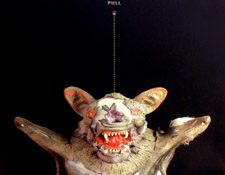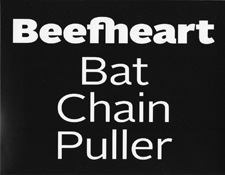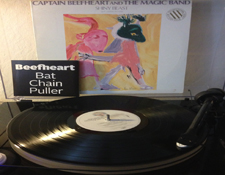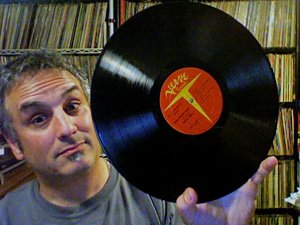It’s the time of year for saving money!
Several years ago, The Zappa Family Trust finally opened their hearts and vaults to release the long overdue original version of Captain Beefheart’s legendary Bat Chain Puller album, recorded in 1976.
 The copious liner notes finally tell the whole story about why the album — which was complete — went unreleased for so long. In short: there was a lot of financial and legal mumbo jumbo going on which caught the not-so-financially-nor-legally-adept Captain in its wooly web.
The copious liner notes finally tell the whole story about why the album — which was complete — went unreleased for so long. In short: there was a lot of financial and legal mumbo jumbo going on which caught the not-so-financially-nor-legally-adept Captain in its wooly web.
The Captain ultimate regrouped, signed to another label and released to much acclaim a trio of albums including new recordings of music from Bat Chain Puller spread across these now-classics Shiny Beast (Bat Chain Puller), Doc at the Radar Station and Ice Cream For Crow.
Getting this CD release of the original Bat Chain Puller album proves it was worth the wait as it provides a logical link between where the Captain was in the mid 70s — when he tried to go commercial — and when he rediscovered his twisted blues roots and reinvented himself on those aforementioned albums.
This is really really good Captain Beefheart music. Great, actually…
The production is simple but effective and the playing as passionate as any of Beefheart’s earlier albums before the commercial “sell out” debacle of 1973 and 1974 (two albums released on Mercury Records).
The sound is crisp and full on this CD-only release which captures a new Magic Band at its inception and a clearly invigorated Captain going for it with relish. As guitarist Denny Walley puts it in the liner notes “… Don’s voice had never sounded better, especially on the spoken word pieces.”
 How does it compare to the later released Shiny Beast (Bat Chain Puller)? Honestly, if you are a fan of Captain Beefheart’s music, you need both as they are similar but different. They were made at different times (1976 vs 1978), in different studios (Los Angeles vs. San Francisco) and a different incarnation of the band — the 1976 version including some original Magic Band members such as John French and Frank Zappa’s then stunt guitarist Denny Walley while the 1978 version featured Jeff Morris Tepper on Guitar and Marimba player Art Tripp III (who was in the Zappa’s Mothers of Invention circa 1968-70 as well as The Magic Band from 1970-74).
How does it compare to the later released Shiny Beast (Bat Chain Puller)? Honestly, if you are a fan of Captain Beefheart’s music, you need both as they are similar but different. They were made at different times (1976 vs 1978), in different studios (Los Angeles vs. San Francisco) and a different incarnation of the band — the 1976 version including some original Magic Band members such as John French and Frank Zappa’s then stunt guitarist Denny Walley while the 1978 version featured Jeff Morris Tepper on Guitar and Marimba player Art Tripp III (who was in the Zappa’s Mothers of Invention circa 1968-70 as well as The Magic Band from 1970-74).
Is one better than the other, you ask? I can’t say. Actually, I like both. I will say that the CD version issued by The Zappa Family Trust sounds remarkably clean and clear, with a nice sense of stereo separation and punchy instrument sounds. The drums sound real punchy. And since it is safe to say this was an all analog recording, there is not much in the way of digital artifacts beyond the inevitable crunch down to the 44.1 kHz 16-bit “Red Book” CD standard. Someday it would be pretty sweet to hear this one as a high resolution download or on a nice, lovingly mastered audiophile LP.
But for an example of some of the differences, lets look at the version of “Flavor Bud Living” as played by John French on Bat Chain Puller is a very different experience than the equally beautiful but structurally different interpretation by Gary Lucas on 1980’s Doc At The Radar Station. The former sounds like it was played on an acoustic guitar of some sort, perhaps one with nylon strings — according to liner notes by Denny Walley, French played “a custom built guitar that looked very much like a Stratocaster but sounded way better” — while the latter version has more of the ploinky (if you will) sound of a (I am guessing) plugged-direct-into-the-board Strat.
Both versions are great. Both are intrinsically different.
 The other neat bonus on Bat Chain Puller is a raw rehearsal-type recording of a song called “Hobo-ism” featuring just the good Captain and guitarist Denny Walley. Its about as close to a modern day twist on old country blues as any of us are likely to get, a genuine 21st Century blues. It is just weird and quirky enough to ensure that Howlin’ Wolf probably wouldn’t have done this tune, but might have been very impressed at how the Captain pulls it off. I won’t spoil Denny’s story about how the recording came about — you’ll have to buy the CD to find that out and read the liner notes.
The other neat bonus on Bat Chain Puller is a raw rehearsal-type recording of a song called “Hobo-ism” featuring just the good Captain and guitarist Denny Walley. Its about as close to a modern day twist on old country blues as any of us are likely to get, a genuine 21st Century blues. It is just weird and quirky enough to ensure that Howlin’ Wolf probably wouldn’t have done this tune, but might have been very impressed at how the Captain pulls it off. I won’t spoil Denny’s story about how the recording came about — you’ll have to buy the CD to find that out and read the liner notes.
So… yeah, if you are a Beefheart fan, you need both versions of this album to understand this music’s journey in its entirety. If you are a newbie, you certainly can’t go wrong by starting with Shiny Beast (Bat Chain Puller). That is actually a pretty good launch point for the novice Beefheart listener.
Anyhow, so there you have it: an essential piece of Beefheart history is finally out for all to enjoy and add to their collections. I am really hoping this will be put out on vinyl at some point as it deserves more than just CD release status.






